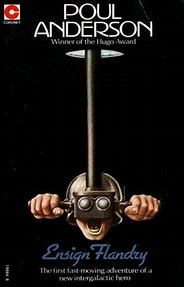"Seeing the anguish upon [Persis], Flandry knew in full what it meant to make an implement of a sentient being."
-Poul Anderson, Ensign Flandry IN Anderson, Young Flandry (Riverdale, NY, January 2010), pp. 1-192 AT CHAPTER THIRTEEN, p. 131.
This, together with the subsequent loss of his youth (also here), is one of the early learning moments for young Flandry.
In The Rebel Worlds, he thinks that he will be a more efficient Imperial officer if he can jettison his conscience. Come off it, Flandry. There are things that you will not do. He himself says that he would join the McCormac Rebellion rather than return Kathryn to Snelund.
However, I can see no reason why the Danellians would not recruit some conscienceless human beings to the Time Patrol. They have to ensure that the Holocaust happens on historical schedule...

9 comments:
Kaor, Paul!
Yes, despite everything, Flandry had a moral core, there were some things he simply would not do. As was the case with Bond, tho I don't think Fleming brought that out as clearly as did Anderson. But "Queen and country" did matter to Bond, showing he had some principles and loyalties.
Ad astra! Sean
Kaor, Paul!
I forgot to add that it was disturbing to think of the Danellians recruiting callous agents whose job would be to make sure the purges/gulags of the USSR and the Nazi Holocaust occurred as recorded in history. There must have been many occasions when time travelers tried to abort the regimes founded by Lenin and Hitler.
Ad astra! Sean
Kaor, Paul!
I think we see Manse Everard feeling some disillusionment about the Danellians in "The Only Game in Town." His task was to somehow nullify the Mongol/Chinese exploratory expedition sent out by Kublai Khan in 1280, and which discovered North America. With the strong implication that any means to do that would be allowed, no matter how ruthless.
Ad astra! Sean
Kaor, Paul!
IIRC, Everard decided he would rather be sent to the exile planet than massacre those Mongols and Chinese.
Ad astra! Sean
There was something like that about it.
Kaor, Paul!
And Manse did find a way of nullifying that Mongol/Chinese expedition without harming its personnel. But he still felt a sense of disillusionment with the Danellians.
Ad astra! Sean
Note that if you change history, you essentially kill everyone in the history that was established.
This is the old debate about time travel with causality violation, of course. I believe that, if we prevent a possible future, then the people who would have lived in that future have not come into existence. Thus, if I had successfully practiced contraception back in 1975, then my daughter would not exist. I would not have killed her.
On the other hand, if I live in Timeline A, then travel into the past and initiate Timeline B, then the four dimensional continuum, B, succeeds the four-dimensional continuum, A, along a second temporal dimension in a hyper-continuum of five dimensions (three spatial and two temporal). Thus, the inhabitants of A live for their entire lifespans from birth to death in A and did exist in the past of the second temporal dimension. I have not killed them.
Kaor, Paul!
And that makes me feel better about the people living in the Carthaginian timeline of "Delenda Est." They were not snuffed out like a candle flame, their timeline simply became inaccessible for time travelers from the Time Patrol universe.
Ad astra! Sean
Post a Comment